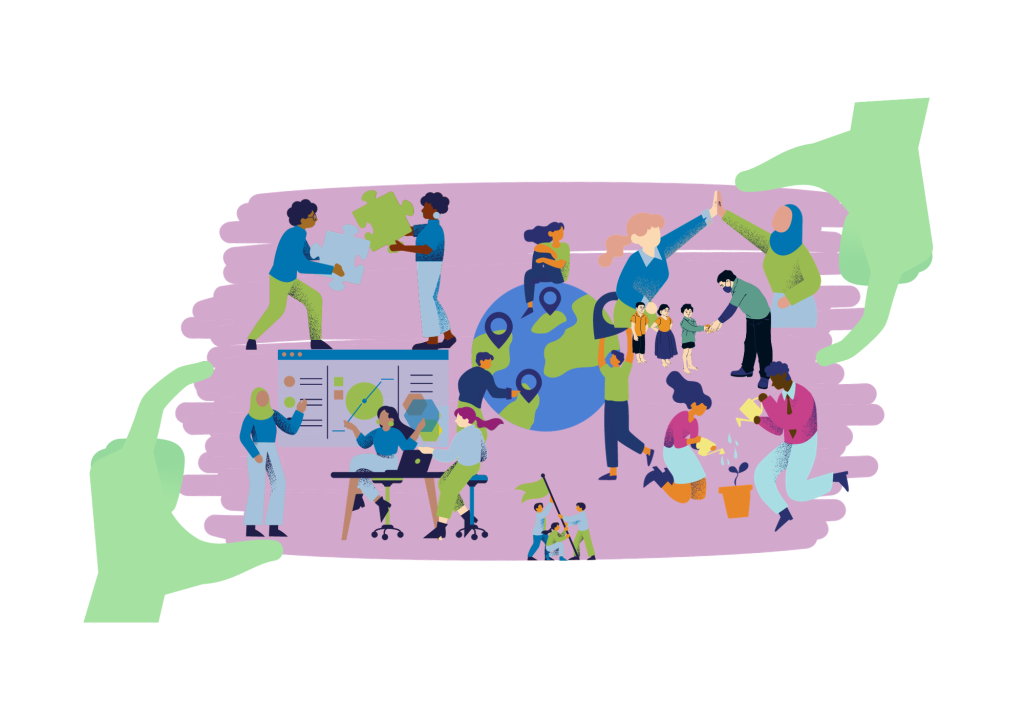Anisa Muzaffar, Senior Research and Policy Officer and Andrea Padilla, Research and Policy Officer at UKCDR
In an increasingly contested world, the role of international development research becomes even more paramount. Underpinning this is the need for holistic and robust guidance that meets global challenges in an agile and responsive manner. From best practice documents to case studies, UKCDR’s myriad analyses help stakeholders across the sector understand what’s needed to create an enabling environment for impactful and sustainable international development research. This blog explores critical factors contributing to the significance of our written analyses. No single aspect outweighs the other. Instead, the factors discussed in this blog come together to support our work, adding value to the findings we provide to the wider research community.
Seeing the bigger picture
UKCDR’s unique positioning in the funding and development landscape provides us with a bird’s eye view of the sector. Our overall perspective of the development research landscape enables us to identify driving trends and gaps. For instance, with GloPID-R and the COVID Circle initiative, we produced a COVID-19 Research Tracker tool and an associated Living Mapping Review which analysed globally funded COVID-19 research across a wide range of disciplines. This overarching perspective helps us break down silos and connect the dots by looking across sectors, topics, funding, and actors, and highlighting where there’s overlap. As a result, we’re able to develop a holistic perspective that fosters collaboration and a more comprehensive approach to global challenges.

Robust research practices
UKCDR is committed to providing reliable guidance and best practice information within international development research. But what exactly makes our analyses so valuable? The answer lies in UKCDR’s unique positioning as a principal convenor. Our access to key data and insights from UK funders, alongside iterative strategic feedback from multiple stakeholders, informs our mapping, analysis and foresight of international development.
The consolidation of complex data and information from a range of sources requires our team to comprehensively analyse and demonstrate key findings to our stakeholders. Our research practices involve in-depth processing of information, as seen in our ‘Lessons learned from ODA research funds‘ publication, which stemmed from a review of 11 200-300-page ODA evaluation reports. Meanwhile, our data tools like Mapping ODA Research and Innovation (MODARI), which provides interactive and simplified summaries of over 2,000 live ODA-funded projects worldwide, further evidences our robust methods. These UKCDR outputs highlight our team’s drive to provide open access, detailed, and reliable resources that can inform practices and policy within the international development community.

The power of perspectives
To enrich the development of our guidance, reports, and other analyses, the member organisations of the Strategic Coherence for ODA funded Research (SCOR) Board help steer the direction of projects, drawing on their experiences and expertise of the development research ecosystem. With first-hand knowledge of the funding landscape, our core funders provide us access to quantitative and qualitative data, thus enhancing our outputs’ quality. Furthermore, the engaging discussions with members of the Board and external collaborators lead to new innovative ideas in guidance we share with the development research community.
The overall results are robust, and peer-reviewed outputs, as we consistently seek the views of experts and stakeholders from varied backgrounds at critical stages throughout our projects’ lifecycles. One such report stemming from our approach includes ‘The Landscape of UK Development Research Impact: An analysis of REF2021 impact case studies’, which benefitted from valuable feedback and support from an expert group representing 19 organisations. Our expert groups, comprising multiple UK and international academics, practitioners, multilateral groups, and funders, alongside our active inclusion of LMIC-based organisations, embed equitability into our research practices.
The diverse viewpoints and debates on key topics like equitable partnerships, research capacity strengthening, and safeguarding bring forward a shared understanding of concepts and frameworks, allowing differing backgrounds across the research community to coalesce around common themes. Drawing further example from the UKCDR analysis of REF2021 impact case studies, our discussions with experts and the research community during the investigative phase unpacked critical understanding of what exactly is meant by ‘international development research and research enablers’. Collaboration within the report-building process provided us with varied feedback which was then used to form definitions of these broadly used terms. This utilisation of multiple perspectives fuels UKCDR’s guidance publications, which may then act as a common guide for the international development research community.
To conclude…
Delivering impactful insights to the sector is at the core of UKCDR’s mission. Our work, reflected in case studies, reports, policy briefs and data tools, is carefully crafted to be of use to diverse audiences—researchers, policymakers, and practitioners. By offering accessible and tailored resources, UKCDR serves as a pivotal hub for transdisciplinary research, fostering coherence and collaboration in the ever-evolving landscape of development research.
